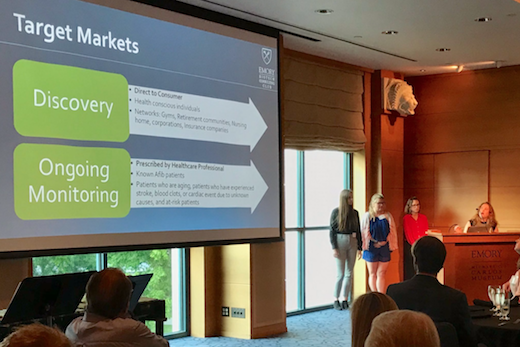Young Emory scientists wanted a taste of what biotech business careers might be like. So they visited the world’s largest poultry industry conference, and got advice from officials at the Food and Drug Administration – all within a couple months.
“I learned a ton about chickens – more than I thought possible. I’ve been explaining it all to my friends,” says Henry Zecca, a graduate student in the Department of Chemistry.
Zecca’s experience and others emerged at a “Gala” Tuesday evening showcasing the Emory Biotech Consulting Club, which aimed to pair student advisory teams with fledgling startup companies emerging from university research.
“If I had known how quickly and independently my team would learn, I might have asked them to solve more difficult problems,” says biochemist Ichiro Matsumura. “My start-up is still in its formative stages, but if it were further along I would want the students on my EBCC team to be running it.”
Matsumura is the founder of Aviabiotic, which would supply probiotics to farmers for the purpose of fortifying chicken meat with omega-3 fatty acids. Aviabiotic was one of five companies in the Club’s initial cohort, described in the table below.
| Company name | Potential product | Founding faculty |
| Aviabiotic | Probiotics to fortify chicken with omega-3 fatty acids | Ichiro Matsumura |
| Migra Therapeutics | Nanoparticles that target pancreatic cancer | Lily Yang |
| OncoSpherix | Small molecule anticancer drug targeting hypoxia | Erwin Van Meir |
| PDxScan | MRI diagnostic algorithm for Parkinson’s disease | Dan Huddleston |
| RePredix | Diagnosis of atrial fibrillation via wearable device | Amit Shah, Gari Clifford, Shamim Nemati |
The student- and postdoc-organized club worked with Emory’s Office of Technology Transfer to recruit companies. The goal was to have student teams advance each company, within the time frame of a few months, on well-defined issues their founders identified. The largest portion of the teams came from graduate students, but also included undergraduates, postdoctoral fellows and technical staff. All the teams met with Richard diMonda, an advisor for the TI:GER technology commercialization program at Georgia Tech.
“The EBCC is a terrific example of how to engage students and make new connections where they can learn about the convergence of science and business issues,” says Mike Cassidy, director of Emory Biomedical Catalyst, who gave a keynote address Tuesday evening.
Some of the companies have already advanced to the point where the founders have patents, Georgia Research Alliance or Small Business Innovation Research grants, or have recruited executives. Others, like Matsumura’s, are best described as promising ideas that need refining before they can attract additional funding. According to Zecca’s presentation, Aviabiotic faces both scientific challenges – transferring synthetic enzymes from cold-water fish into warm gut bacteria – and marketing/regulatory questions.
In contrast, OncoSpherix, founded by Winship Cancer Institute scientist Erwin Van Meir and Georgia State chemist Binghe Wang, has a decade of research on inhibitors targeting hypoxia-inducible factor behind it. OncoSpherix recently enlisted Margaret Offermann, a former colleague at Winship with experience at other startup companies, as chief executive officer.
Van Meir says the student team “forced us to more actively think about things that we had somewhat left on the back burner, such as market research and the competitive landscape.”
“EBCC provided a really unique opportunity to graduate students in that it allowed us to actually experience what it meant to be a consultant and work with real clients,” says Kamyra Edokpolor, a Neuroscience graduate student on the team advising OncoSpherix. “The experience solidified that this is a career I'd like to pursue in the future post-graduation.”
Other nascent technologies such as PDxScan and RePredix, based on diagnostic algorithms rather than tangible therapies, faced a different set of business issues, on which student teams were supposed to give advice.
RePredix, for example, is stepping into a market with some big players, such as Apple, which recently reported that its watch can detect atrial fibrillation, the common heart arrhythmia, although it can raise false alarms.
Asked about Apple, team leader Brandy Wade confidently noted that RePredix’s technology was more precise. That’s partly because it collects more data on someone’s heart beats over a longer time. A better comparison, which might be appropriate in seeking clearance from the FDA, would be other devices such as AliveCor, which uses a finger pad, she says.
The Emory Biotech Consulting Club was co-founded last year by Emory chemist Bill Wuest, who participated in similar activities during graduate school at the University of Pennsylvania and considered going into business consulting. He says he wanted to provide an opportunity for graduate students and other young scientists to develop new skills and make personal connections as part of exploring non-academic career options.
“Although I ultimately decided to stay in academia, the experience helped me reframe the way I think about translational science,” he says.
To launch the club, Wuest obtained funding from chemist Dennis Liotta. Laney Graduate School dean Lisa Tedesco has agreed to support the club for the next five years. The kickoff event, after which participants joined advisory teams, was in January. Most of the organizing work came from president Taylor Hari and vice-president Erika Csatary, who are both in Wuest’s lab. They plan to have the club be student-run and organized, and have been recruiting additional members for the executive board.
Hari, a postdoctoral fellow who took MBA courses in graduate school, was hired with his business orientation in mind and is already planning the next cohort, he says.

